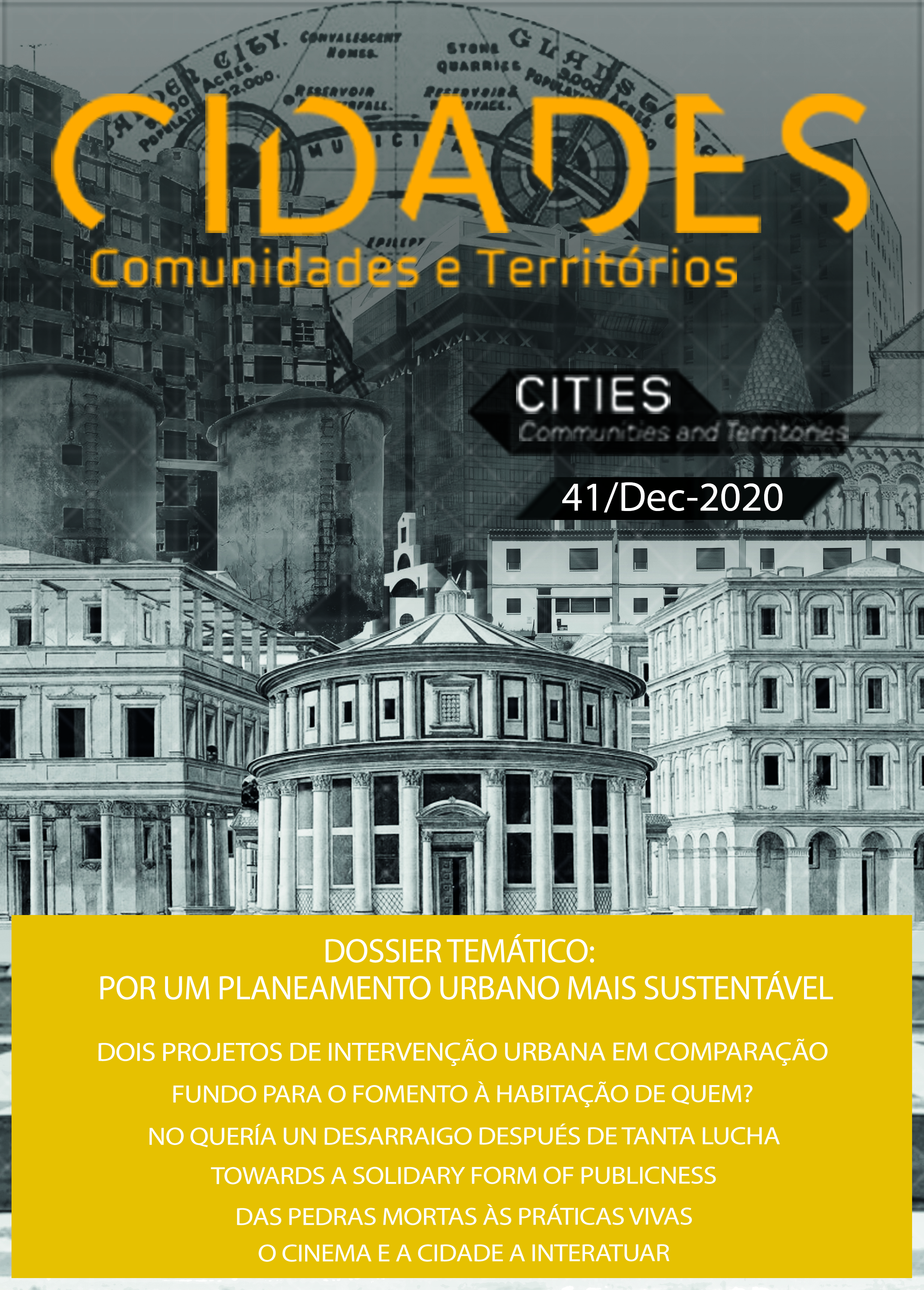Towards a solidary form of publicness: Circulation of cultural assets between alternative cultural organizations of Istanbul and their micro public(s)
Palavras-chave:
solidarity networks, publicness, circulation, cultural organizations, IstanbulResumo
One of the world’s mega cities, Istanbul is changing drastically with the neoliberal and conservative policies transforming its public spaces and sociocultural fabric in contested ways. These changes require stimulating reflections on the formation of new public spheres. This paper approaches this problematic through a focus on the ways in which alternative cultural organizations in Beyoğlu- the cultural hub of Istanbul-create new forms of publicness. Drawing on a comprehensive empirical research, this paper argues for a solidary form of publicness developing in and through alternative cultural organizations of Istanbul via the circulation of cultural assets. This particular form stimulates a thinking about publicness as circulation going beyond the too simple idea of the physical togetherness of people in one particular place. Instead, it aims to reconceptualize publicness through the solidarity relations of alternative cultural organizations and their micro public(s) and to observe the formation of multiple (counter) public spheres as an emergent infrastructure of circulation connecting different sites, people and media across cultural spaces.
Referências
Aksoy, A. and Seyben, B-Y. (2015), “Storm over the state cultural institutions: new cultural policy direction in Turkey”, International Journal of Cultural Policy, 21(2), pp. 183–199.
Amin, A. (2006), “Good City” Urban Studies, 43 (5-6), pp. 1009–1023.
Amin, A. and Graham, S. (1997), “The Ordinary City”, Transactions of the Institute of British Geographers, 22 (4), pp. 411–429.
Başar, D. (2014), Performative publicness: alternative theater in Turkey after 2000s, Unpublished Master Thesis, Istanbul, Boğaziçi University.
Blomley, N. (2005), “Flowers in the bathtub: boundary crossings at the public-private divide” Geoforum, 36, pp. 281-296.
Candan, A., and Özbay, C. (2014), Yeni Istanbul Calismaları [New Istanbul studies], Istanbul: Metis Yayınları.
Cevik, B. S and Seib, P. (2015), Turkey’s Public Diplomacy, New York: Palgrave Macmillan US
Cochrane, A. (2014), “Interviews” In K. Ward (ed.), Researching the City, London: Sage Publications, pp. 38–53.
Davis, A. (2008), Investigating Cultural Producers. In M. Pickering (ed.) Research Methods for Cultural Studies, Edinburgh: Edinburgh University Press, pp. 53–68.
Dervişoğlu, G. (2009), “Corporate Support on Art: A vicious or virtuous cycle?” In What Keeps Mankind Alive? The Texts: 11th International Istanbul Biennial, pp. 39-55. Istanbul: Istanbul Foundation for Culture and Arts, Yapı Kredi Publications.
Dikeç, M. (2012), “Space as a mode of political thinking.” GeoForum, 43, pp. 669-676.
Eckardt, F. (2008), Introduction: Public Space as a Critical Concept. Adequate for Understanding Istanbul Today? In F. Eckardt and K. Wildner (eds.) Public Istanbul: Spaces and Spheres of the Urban, London: transcript publishing house, pp.13-20.
Edwards, G. (2010), “Mixed-Method Approaches to Social Network Analysis”, ESRC National Centre for Research Methods Review Paper no 15. Available at: http://eprints.ncrm.ac.uk/842/1/Social_Network_analysis_Edwards.pdf
Erensu, S. And Karaman, O. (2017), “The Work of A Few Trees: Gezi, Politics and Space”, International Journal of Urban and Regional Research, 41 (1) pp. 19-36.
Ersoy, Ö. and Kortun, V. (2018), “On Public Mindedness: Conversation with Vasıf Kortun”. Asia Art Archive. Available at: https://aaa.org.hk/en/ideas/ideas/on-public-mindedness-in-conversation-with-vasif-kortun.
Göktürk et. al. (2010), Orienting Istanbul: Cultural Capital of Europe?, London: Routledge
Göle, N. (2006), “Europe’s Encounter with Islam: What Future?”, Constellations, 13 (2), pp. 248–262.
Göle, N. (2013), “Anatomy of a Public Square Movement”, Insight Turkey, 15 (3), pp. 7–14.
Hürriyet Daily News (2017), “Court arrests Turkish activist Osman Kavala over failed coup attempt”, 1 November 2017. Available at: http://www.hurriyetdailynews.com/court-arrests-turkish-activist-osman-kavala-over-failed-coup-attempt-121694.
Inceoglu, I. (2015), “Encountering difference and radical democratic trajectory: an analysis of Gezi Park as public space”, City,19 (4), pp. 534-544.
Iveson, K. (2007), Publics and the City, Oxford: Blackwell.
Kahraman, H. B. (2008), “The End of the ‘New’ as We Know: Post 1990 and the ‘New’ Beginnings in Turkish Culture”, Third Text, 22(1), pp. 21-34.
Mayring, P. (2000), “Qualitative Content Analysis”, Forum: Qualitative Social Research 1 (2). Available at: http://nbn-resolving.de/urn:nbn:de:0114-fqs0002204
Muir, J. (2008), “ ‘Are you taking notes on us?’ Reflections on case study research in urban environments” In P. J. Maginn, S. M. Thompson and M. Tonts (eds.), Qualitative Urban Analysis: An International Perspective, Amsterdam: Elsevier, pp. 105–132.
Navaro-Yashin, Y. (2002), Faces of the State: Secularism and Public Life in Turkey, New Jersey: Princeton University Press.
Özbek, M. (2004), Kamusal Alan [Public Sphere], Istanbul: Hil Yayin
Robins, G. (2015), Doing Social Network Research: Network-based Research Design for Social Scientists, London: SAGE Publications.
Rose, C., M. (1998), “The several futures of property; of cyberspace and folktales, emission trades and ecosystems”, Minnesota Law Review, 83, pp. 129-182.
Sanul, G. and Van Heur, B. (2016), The Invisible City of Alternative Theater: Tactics, Collective Actions and Micro-publics in Istanbul’s Cultural Economy, Law, Social Justice and Global Development, Special Issue ‘Cultural Economies and Cultural Activism, (1), pp. 1-14.
Sanul, G. & Van Heur, B. (2018), “Spaces of openness: Urban citizenship and cultural infrastructures of common life in Istanbul”, City, 22 (5-6), pp. 801-819.
Sennett, R. (2018), Building and Dwelling: Ethics for the City, New York: Farrar, Straus and Giroux.
Tonkiss, F. (2013), “Austerity Urbanism and the Makeshift City”, City, 17 (3), pp. 312–324.
Turam, B. (2013), “The Primacy of Space in Politics: Bargaining Rights, Freedom and Power in an Istanbul Neighborhood.” International Journal of Urban and Regional Research, 37 (2), pp. 409–429.
Turam, B. (2015), Gaining Freedoms: Claiming Space in Istanbul and Berlin, Stanford: Stanford University Press.
Turam, B. (2018), “Urban Civility Defying Political Authoritarianism? Unpacking Turkey’s Reversal of Democracy”, In F. Duina (ed.), States and Nations, Power and Civility: Hallsian Perspectives. Toronto: University of Toronto Press, pp. 100–121.
Yardımcı, S. (2007), “Festivalising Difference: Privatisation of Culture and Symbolic Exclusion in Istanbul”, EUI Working Paper RSCAS 2007/35.
Available at: http://cadmus.eui.eu/handle/1814/7670.
Zizlsperger, A. “Mapping Turkey: Contemporary Visual Arts in Turkey”, Dutch Culture, pp. 1-49. Available at: https://dutchculture.nl/en/mapping-turkey.
Downloads
Publicado
Edição
Secção
Licença
CIDADES, Comunidades e Territórios by DINÂMIA'CET-Iscte is licensed under a CC-BY licence.







